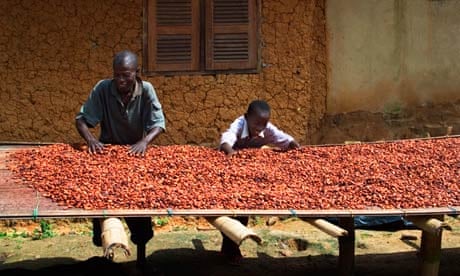The effects of climate change can be seen all around us; all except the most staunch deniers have to admit that it is happening whether they like it or not. Glaciers are shrinking, water levels are changing and regional climates are also shifting. The rapid escalation of change paired with very convincing scientific evidence suggests that the change is anthropogenic in nature, which, in a way, is a good thing. If we're causing it, it means we might have a chance at arresting or reversing it, instead of being forced to accept it as a natural variation that will resist intervention.
One area where we're really starting to see the effects of climate change first-hand is with global agriculture. Most crops grow within a relatively narrow range of climatic conditions. They need the right amount of rain and sunshine, they need to grow in the right kind of soil and they have fussy life requirements, because they've evolved and been bred for very specific conditions. You can't grow bananas in Alaska or broccoli at the equator unless you're willing to expend a lot of money to create a very controlled environment, and even then, it's going to be fussy and painstaking.
In areas where some crops have traditionally been grown with great success, we're starting to see problems. Crop failures are occurring where they shouldn't and those failures are definitively connected to changes in the climate. The drought that devastated the US midwest over the summer could have been an episodic turn of the weather, although there are some strong arguments for a connection to climate change, but what's happening to, say, the cocoa crop in Africa is most certainly linked to climate change. West Africa is getting too hot to support the cocoa crop. While it's going to take some time, it will happen eventually and people are trying to plan ahead for what is looking like the inevitable.
Cocoa has been the recipient of a lot of blows over the last few years. There was a fungal infection that farmers worried could ruin the crop and drive the price of cocoa sky-high, and now west Africa, a major cocoa producer, might not be able to grow it any more within the relatively near future. That's unless researchers can develop drought-tolerant plants capable of handling hotter, drier conditions like those forecast for west Africa, and this raises concerns about reactive breeding and genetic engineering. If everyone's focused on this issue now, what's going to be the problem in 50 years?
The problems with the cocoa crop in west Africa aren't just a worry for chocolate fiends like me. Obviously I want a secure and uninterrupted supply of chocolate because I take my chocolate very seriously. Chocolate is also a huge industry, with a number of major companies involved in the transport, processing, and production of chocolate; Switzerland must be glad it's got banking as a backup, is all I'm saying.
For west African farmers, the loss of cocoa farms could present serious problems. Those farms were installed in the first place because of the high demand for cocoa in the west, displacing food crops and subsistence farming. Cocoa farming in some regions dates to colonial rule and, as a legacy of colonialism, its decline could have very far-reaching effects. Without cocoa, communities will have trouble supporting themselves, providing employment to residents, feeding themselves and maintaining social order. In a world where people are poor and hungry, they tend to get desperate.
Already, some regions of Africa are plagued by food distribution problems created by western interventions. Those problems are going to get worse as the world's supply of food shifts and these same parts of Africa bear the brunt of climate change. Temporary fixes in the order of food aid are often proposed, but those aren't going to solve the larger problem: we are drying Africa out, we are milking it for all the resources we can get, and then we are abandoning the empty husk and letting people fend for themselves.
And then we produce poverty and violence porn to showcase the horrors of Africa. It is a twisted system we have created, and it's one that weaves over and under and back upon itself in a snarled web. Since climate change is heavily influenced by western practices and lifestyles, including pressures on the global south to "develop" in the way we deem appropriate, we must tie environmental justice in with the larger picture of colonialism, food security and traditional ways of life under threat. We have wrought a mess, and now we must clean it up.
This isn't about whether I can get the kind of chocolate I want at the store, in the long term. Nor is it about handing aid to Africa or providing assistance. It's about removing the western chokehold on Africa and being accountable for the results of our interference: in farming, in government, in communities large and small. Cocoa farms were build at our demand to cater for our hunger for chocolate, and now that they are facing a very real crisis, we need to examine our role in the development of that crisis and the options for fixing it.
Africa doesn't need the west to tell it what to do, but it does need the west to take responsibility for its actions and to be prepared to co-operate in the development of an effective approach to living in a world we have created.
